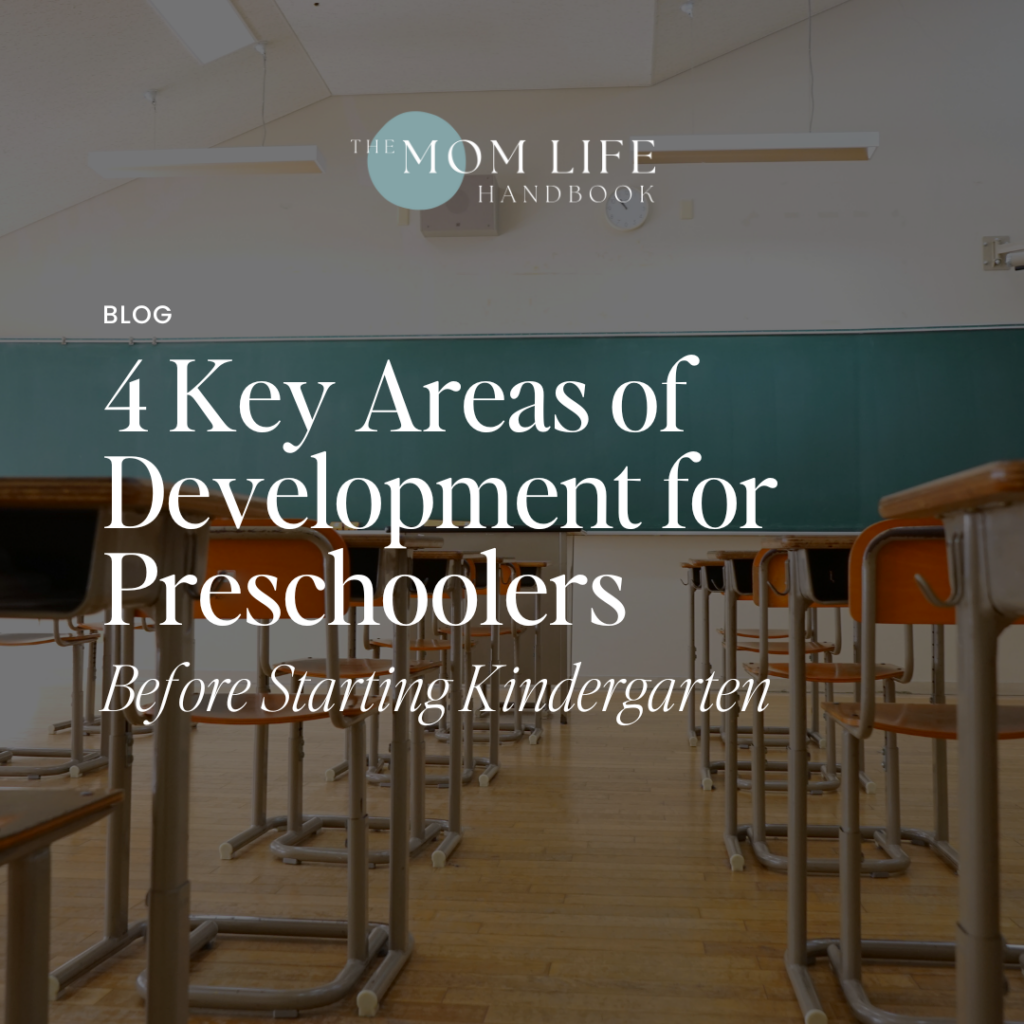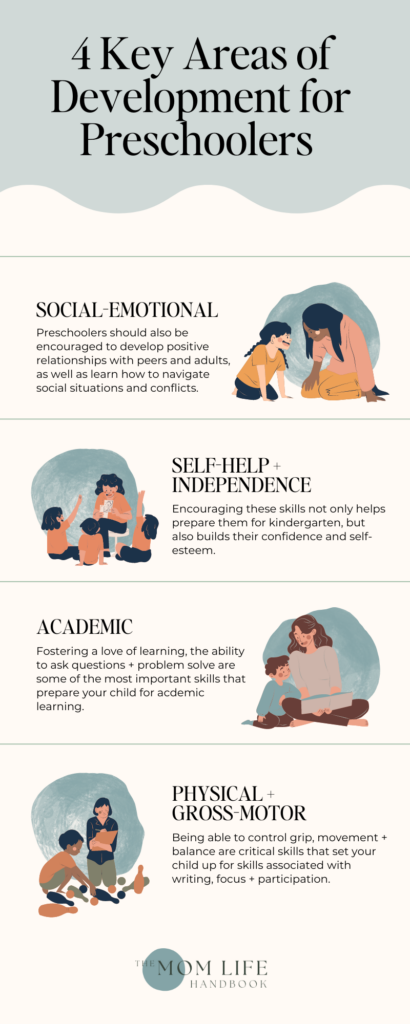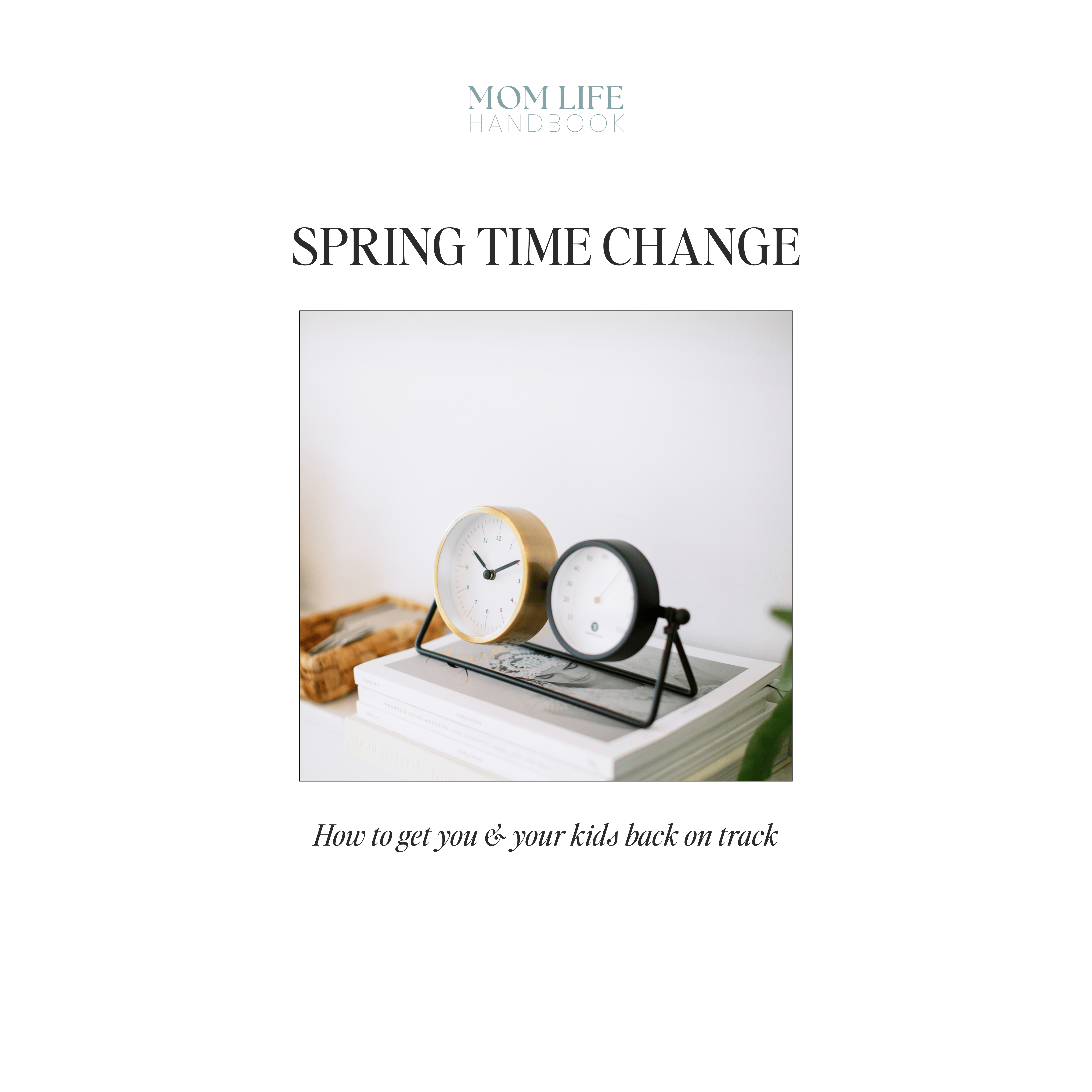4 Key Areas of Development for Preschoolers Before Starting Kindergarten

| A 10-Min. Read
Understanding what your preschooler should know before kindergarten can be a daunting task. Especially if you’re a first-time parent or this next preschooler of yours is totally different than their older sibling. You’re likely wondering whether your child is academically ready. Or if they’re mature enough to participate successfully. It’s normal to worry or wonder.
On the flip side, there are other parents who unwittingly assume their child is prepared to start because they can already read. But it’s important to realize that academics are just one piece of the puzzle. While skills like counting + letter recognition are valuable, a child’s readiness to be an active + contributing participant in the classroom environment are arguably more important indicators of readiness. It’s still important to focus on your child’s overall development when gauging readiness.
Frustratingly, there’s very little information out there that is consistent + reliable when it comes to being informed about what really matters when it comes to preparing your child for their first year of elementary school. This is largely due to the fact that just 19 states actually require kindergarten for all students. The resulting inconsistencies in expectations make it very confusing for parents to know exactly what their preschooler should know before kindergarten.
Which is why this blog post helps you get clear on which 4 areas are most important in a successful first year of elementary school.
What a preschooler should know before kindergarten
In this blog post, we will discuss the 4 key areas you can focus on in order to prepare preschooler for kindergarten. We’ll also explore the concept of redshirting + what you should consider before enrolling your child in kindergarten. And be sure to download the free guide to Navigating Kindergarten Readiness for a breakdown of your exact next steps in supporting your child.
- What Your Child Doesn’t Need to Know
- Signs Your Child is Ready for Kindergarten
- How to Prepare for Kindergarten
- What to Do If You’re Uncertain Your Preschooler is Ready
- Redshirting Your Preschooler
- Considerations Prior to Enrollment
- Download the Free, Kindergarten-Readiness Checklist that includes:
- 20 Ways to Prepare for Kindergarten
- 10 Important Questions to Ask Before Enrolling Your Child in Kindergarten
What your child doesn’t need to know
I know, starting what your preschooler doesn’t need to know before starting kindergarten seems unhelpful, but what I really want to do here is relieve some of the pressure for you. Because, truth be told, a lot of what you think is important for your child to know probably doesn’t matter all the much.
Most states + territories have adopted the Common Core Learning standards which clearly communicate exactly what a kindergartener should master by the end of their kindergarten year.
If you want to know specifics, take a peek at what they cover. But some of the big takeaways are that it’s in kindergarten that your child will learn letter names + sounds as well as how to count to 100 + add/subtract up to 20. Your child does not need to know how to write their letters or name. These are all skills that your child’s kindergarten curriculum will teach them. I promise.
As a side note, if you live in Virginia (Reading + Math), Texas, Alaska, and Nebraska (Reading + Math), these are the only 4 states that don’t use the Common Core so I’ve linked to their kindergarten standards for your reference as well. But more or less, the skills covered by these standards are very similar to the Common Core.
What are the signs that your preschooler is ready for kindergarten?
So what does matter? As an educator, I think of kindergarten not only the time to establish that foundational understanding in literacy and math, but also a time to learn a lot of the core social + emotional behaviors that successful students possess in the longterm.
When we look at your preschooler’’s readiness for kindergarten, there’s a lot more to consider when it comes to the skills they need to be developing before you enroll your child that go beyond the curriculum.
Not only do you want to consider whether your child is exhibiting behaviors that set them up for learning concepts (such as being able to focus for 5-10 minutes at a time), but also whether they’re prepared to participate in the classroom community (such as organizing their materials, taking turns or being capable of using the bathroom independently).
There are many signs that your preschooler is ready for kindergarten. And your child won’t check all of these boxes before kindergarten starts. But I want to break down for you what a preschooler should know before kindergarten in the context of 4 key areas of development that your child should be progressing in before beginning elementary school.
It will not only help you know where to support your child in these months leading up to the first days of school, but also inform your decision to enroll your child in kindergarten at age 5 or 6 (more on that later).
So let’s break down these 4 key areas right now + then we’ll talk more about what your next steps will be.

Social + Emotional Skills
Social and emotional development is a crucial area for preschoolers to focus on before starting kindergarten. This includes developing skills such as sharing, taking turns, and expressing emotions in a healthy way. Preschoolers should also be encouraged to develop positive relationships with peers and adults, as well as learn how to navigate social situations and conflicts. These skills will not only help them succeed in school, but also in life.
Here are some examples of social + emotional skills your child should begin working on:
- Waits patiently for their turn or to speak
- Follows basic directions
- Can communicate with adults + peers alike
- Seeks out friendship with peers
- Takes turns in conversations and games
Self-Help + Independence Skills
Another important area of development for preschoolers is self-help and independence skills. This includes things like dressing themselves, using the bathroom independently, and feeding themselves. Encouraging these skills not only helps prepare them for kindergarten, but also builds their confidence and self-esteem.
Parents can start by giving their child simple tasks to do on their own, such as putting on their shoes or pouring their own drink. As they become more confident, they can gradually take on more responsibilities.
Here are some examples of the self-help + independence skills many kindergarteners develop before kindergarten:
- Takes care of personal belongings
- Speaks up + communicates needs
- Uses the bathroom independently
- Is developing personal hygiene skills
- Puts on jacket and tries to zip or button independently
Characteristics of Academic Readiness
Considering the characteristics of academic readiness is another important area of development for preschoolers before starting kindergarten. This includes basic literacy and numeracy skills such as recognizing letters, numbers, and shapes, as well as being able to count and identify colors.
These are some characteristics of academic readiness many preschoolers display before elementary school:
- Shows curiosity or initiates learning
- Persists when problem-solving
- Demonstrates creative expression
- Can be attentive to tasks at hand
- Asks clarifying questions to understand more
Physical Development + Motor Skills
Physical development and motor skills are crucial for preschoolers before starting kindergarten. Not only is there a certain level of strength their bodies require for sitting still or writing, but developing their balance + hand-eye coordination through activities such as throwing and catching a ball help them participate in physical activities and sports as well.
Here are some examples of physical development + motor skills to look for:
- Uses scissors to cut paper
- Can grip a pencil or crayon to write or draw
- Independently uses the bathroom
- Can kick + throw a ball
- Is able to visually discern (can complete puzzles or enjoys hidden-picture activities)
How to prepare your preschooler for kindergarten
If there is one important understanding you walk away with, let it be this: development is unique to every child. While you now know what a preschooler should know before kindergarten, it doesn’t mean they have to perfect these skills. Remember that there are certain areas of development that will come to them more easily than others. Just because they haven’t mastered all of these skills does not mean they aren’t a good fit for kindergarten this fall.
We’ll talk in a moment about what options you have if you’re noticing many gaps or delays but let’s first tackle what you can be doing at home to help support your child’s progress over the next few months. You may find that this small amount of extra intention makes all the difference.
Here are a few ideas to get you started, but be sure to check out the free Navigating Kindergarten Readiness guide for 20 area-specific ideas for targeted support as well.
- Participate in classes or camp this summer
- Teach your child to read and write their name
- Read every day + foster a love of reading in your home
- Focus on rhyming words in books or through play
- Introduce letter sounds to your child
- Incorporate counting into everyday life
- Provide opportunities for new social interactions with peers and adults
- Encourage the development of self-care skills
- Foster your child’s sense of responsibility for their belongings
- Play games that help your child learn about numbers, letters, and shapes.
- Help your child develop social skills by playing with other children.
- Make sure your child gets enough sleep.
What to do if you’re uncertain your preschooler is ready for kindergarten
After reviewing what a preschooler should know, you may be wondering whether your child really is ready to start kindergarten. That can feel worrisome. I recommend taking some of the following steps to help you gain some clarity around this concern:
- Reach out to the school district about their enrollment process + readiness assessment
- Speak with your child’s pediatrician about your child’s history of achieving developmental milestones
- Connect with any specialists (SLP, OT, PT, VT) your child sees about updating any assessments or progress reports
- Consider alternative school options if you’d like to wait a year + your public school district has strict placement policies that are based on age alone
If you’re worried development is very delayed, rest assured. This is a very normal concern + doesn’t necessarily mean your child is going to struggle in school. It might just mean they could benefit from additional time or support before beginning kindergarten.
There are likely options such as specialized support (such as a structured preschool environment, speech-language therapy or physical therapy) or delaying the start of kindergarten by one year.
Redshirting Your Preschooler
As a K-8 teacher + intervention specialist for nearly 15 years, I can definitively say that there are commonalities that I’ve observed over the years when it came to the students who were ready for school + those who would’ve benefitted from an extra year at home or in preschool.
The preschool years are a time of rapid growth + change—a lot can happen in 12 months. Not to mention, birthday cut-off dates can mean that some kids are already 6 by the time they start kindergarten, while others are barely 5. That’s a wide range in development at this young age.
Redshirting is when you start kindergarten a year later than you would normally. This means that your child will be one of the oldest kids in your class.
Some parents do this because they think their child will be more ready for school if they wait a year. Others do it because their child’s birthday is at the end of the summer, and they don’t want their child to be the youngest in their class.
There are pros and cons to redshirting. Some people think that kids who redshirt do better in school because they are more mature. And redshirting your child on the mere basis of academic advantage is not a reason to redshirt. It can have social + emotional implications that are equally important in the experience they have at school.
In truth, the biggest advantage is to give children the extra year to develop + be more available to learning + participating in the classroom environment successfully. Children who are the best candidate for this are those who are delayed in several of the 4 key areas of readiness.
Many parents considering whether to redshirt worry that it sends a message to their child that they aren’t as good or smart as their age-level peers. In my experience, the experience of repeating preschool is less detrimental than pushing a child through when they aren’t ready that has the potential to negatively impact their entire educational career. The key to successfully waiting another year is supportive communication + encouragement that is reassuring rather than shaming.
Ultimately, the decision of whether or not to redshirt is up to the parents. There is no right or wrong answer. This is just one of those decisions where you do the best you can with the information you have.
Considerations Prior to Enrollment:
I have a few action steps you can take to dive deeper into your child’s readiness. I also recommend grabbing the Navigating Kindergarten Readiness guide because it includes 10 questions you can ask yourself or of professionals to inform your decision to enroll this year or next.
In the meantime, here are a few other proactive steps you can take to choose the placement that’s best for your child:
- Talk to your child’s preschool teacher. They can give you specific advice on how to prepare your child for kindergarten.
- Visit the school your child will be attending. This will give you a chance to see the classroom and meet the other teachers and students.
- Attend parent-teacher conferences. This is a great opportunity to ask questions and get feedback on your child’s progress.
- Be patient. It takes time for children to adjust to a new environment. Be understanding and supportive of your child during the transition to kindergarten.
5 Reminders Every Parent Should Hear
Starting kindergarten is a big step for your child. It helps to know what a preschooler should know before kindergarten. And by following the tips in this blog post, you can help your child prepare for this exciting new chapter in their life.
If I could leave you with anything, it’s these 5 key understandings—
- Your child does not have to know the alphabet or their numbers to be ready for kindergarten
- Every child is unique, developing on their own timeline.
- You know your child best. You do not have to listen to everyone else’s opinions about what is best for your child.
- It’s appropriate for you to tap into experts to inform your enrollment decision.
- It’s okay to wait.
Free Download: Navigating Kindergarten Readiness—Expert Strategies for Parents
I want to help make this blog post as approachable + actionable for you as possible. Inside this free, PDF guide you’ll find:
- 10 Questions to ask yourself before enrolling your child
- 20 ideas to help your child prepare for kindergarten
You May Also Like—
- Back-to-School Season Is More Than ShoppingBack-to-school season doesn’t have to be overwhelming. Here are 5 stressors to be on the lookout for and how to make August easier for you + the whole family.
- Survival Guide for Moms: What to do During Summer Break at HomeWant to make the most of summer break with your little one? This guide has got you covered with tips + strategies to do just that!
- The 10 Best Outdoor Toys for Preschoolers to EnjoyLooking for fun outdoor toys for your preschooler? Check out our list of the 10 best toys to keep them entertained + active all summer long.
- 4 Key Areas of Development for Preschoolers Before Starting KindergartenWondering what your preschooler should know before starting kindergarten? This article covers the 4 key areas of development for success.
- Ideas for Spring Break—50 Activities for Pre-K + KindergartenWant ideas for spring break with your kindergartener or preschooler? Here are 50 ways to make the most of your time at home with the kids!
© MOM LIFE HANDBOOK 2025 | Privacy, Terms + Conditions
Design by tonic | Photos by K WEINBERG & E Christopoulos
© MOM LIFE HANDBOOK 2025 | Design by tonic | photos by KRISTIN WEINBERG and Erin Christopoulos | Privacy, Terms + Conditions
Mom life is complex,
But it doesn't have to be complicated.
Get your weekly permission slip.
Join 1,000+ moms getting an honest, weekly guide to doing less (not more).









+ Show / Hide Comments
Share to: